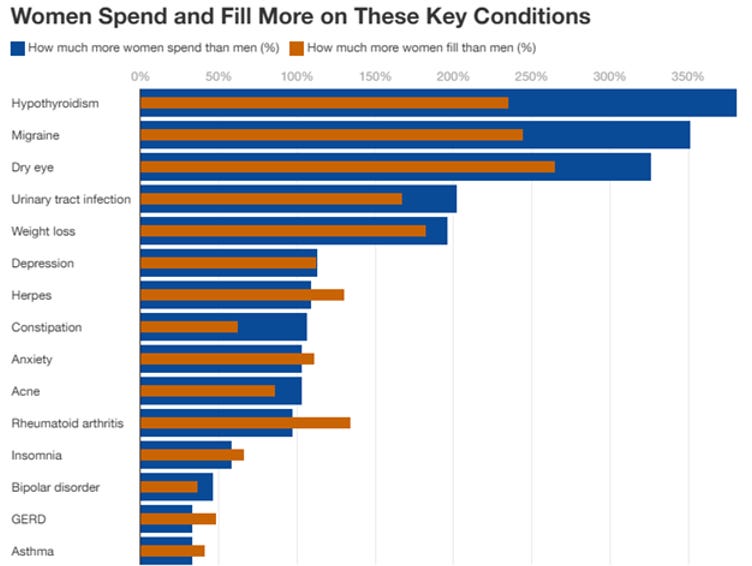Women pay billions more in out-of-pocket drug costs than men (by Patricia Toro, MD MPH)
March 24, 2025
Source: Marsh, et al Good Rx March 7, 2025. Blue is cost and orange is utilization
A “pink tax” refers to products or services marketed to women that are priced higher than identical products marketed to men. GoodRx earlier this month posted a study looking at medications filled by women and men and found that women spend nearly 30% more out of pocket on prescriptions, totaling $8.5 billion more ($39.3 billion by women versus $30.5 billion by men) in 2024.
The higher spending was due to several reasons. First, women see their health care providers more often. Second, women have a higher burden of diseases and conditions overall and fill more, and more expensive, medications. Third, women outspend men particularly in depression and anti-anxiety treatments. Lastly, there are some conditions that affect only the female anatomy, like endometriosis, which raise overall costs for women.
The highest difference in costs of medications between women and men came in the age group of 18-44 years, prime years in the workforce. In some years within this age range, the difference in spend was up to 64% higher for women. The only age range where men consistently outspent women was in boys under age 18 years, likely due to higher rates of ADHD diagnosis and treatment in boys.
Women also spend more to maintain and improve their health than men, according to this GoodRx report. That ongoing care might lead to earlier diagnoses and less productivity loss. While this excess spending among women is not a traditional “pink tax”, it is another way that women face higher health care expenses than men.
Implications for employers:
● Studies that assess affordability without considering gender might understate the threat of financial insecurity to women.
● Employers can ensure that carriers correctly administer women’s preventive care services which the Affordable Care Act requires to be offered with no cost sharing.
● Employers can consider lowering or eliminating cost-sharing for generic medications, particularly for mental health conditions.
Thanks for reading. You can find previous posts in the Employer Coverage archive
Please subscribe, “like” share this newsletter with friends and colleagues. Thanks!
Tomorrow: Job-based health coverage unaffordable for many





